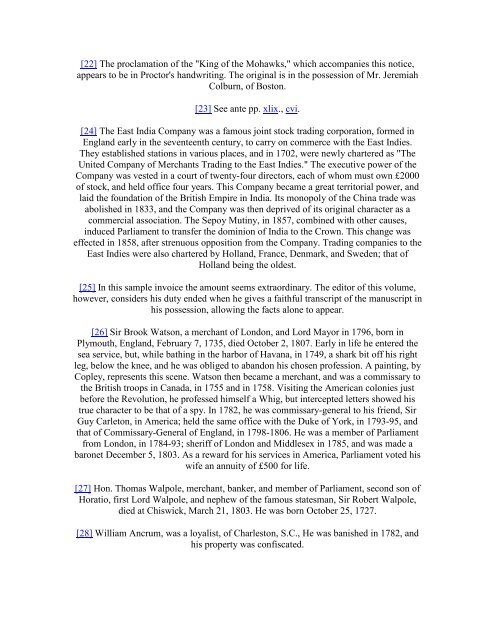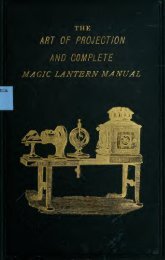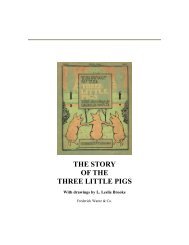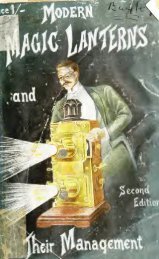TEA LEAVES: - Yesterday Image
TEA LEAVES: - Yesterday Image
TEA LEAVES: - Yesterday Image
Create successful ePaper yourself
Turn your PDF publications into a flip-book with our unique Google optimized e-Paper software.
[22] The proclamation of the "King of the Mohawks," which accompanies this notice,<br />
appears to be in Proctor's handwriting. The original is in the possession of Mr. Jeremiah<br />
Colburn, of Boston.<br />
[23] See ante pp. xlix., cvi.<br />
[24] The East India Company was a famous joint stock trading corporation, formed in<br />
England early in the seventeenth century, to carry on commerce with the East Indies.<br />
They established stations in various places, and in 1702, were newly chartered as "The<br />
United Company of Merchants Trading to the East Indies." The executive power of the<br />
Company was vested in a court of twenty-four directors, each of whom must own £2000<br />
of stock, and held office four years. This Company became a great territorial power, and<br />
laid the foundation of the British Empire in India. Its monopoly of the China trade was<br />
abolished in 1833, and the Company was then deprived of its original character as a<br />
commercial association. The Sepoy Mutiny, in 1857, combined with other causes,<br />
induced Parliament to transfer the dominion of India to the Crown. This change was<br />
effected in 1858, after strenuous opposition from the Company. Trading companies to the<br />
East Indies were also chartered by Holland, France, Denmark, and Sweden; that of<br />
Holland being the oldest.<br />
[25] In this sample invoice the amount seems extraordinary. The editor of this volume,<br />
however, considers his duty ended when he gives a faithful transcript of the manuscript in<br />
his possession, allowing the facts alone to appear.<br />
[26] Sir Brook Watson, a merchant of London, and Lord Mayor in 1796, born in<br />
Plymouth, England, February 7, 1735, died October 2, 1807. Early in life he entered the<br />
sea service, but, while bathing in the harbor of Havana, in 1749, a shark bit off his right<br />
leg, below the knee, and he was obliged to abandon his chosen profession. A painting, by<br />
Copley, represents this scene. Watson then became a merchant, and was a commissary to<br />
the British troops in Canada, in 1755 and in 1758. Visiting the American colonies just<br />
before the Revolution, he professed himself a Whig, but intercepted letters showed his<br />
true character to be that of a spy. In 1782, he was commissary-general to his friend, Sir<br />
Guy Carleton, in America; held the same office with the Duke of York, in 1793-95, and<br />
that of Commissary-General of England, in 1798-1806. He was a member of Parliament<br />
from London, in 1784-93; sheriff of London and Middlesex in 1785, and was made a<br />
baronet December 5, 1803. As a reward for his services in America, Parliament voted his<br />
wife an annuity of £500 for life.<br />
[27] Hon. Thomas Walpole, merchant, banker, and member of Parliament, second son of<br />
Horatio, first Lord Walpole, and nephew of the famous statesman, Sir Robert Walpole,<br />
died at Chiswick, March 21, 1803. He was born October 25, 1727.<br />
[28] William Ancrum, was a loyalist, of Charleston, S.C., He was banished in 1782, and<br />
his property was confiscated.





